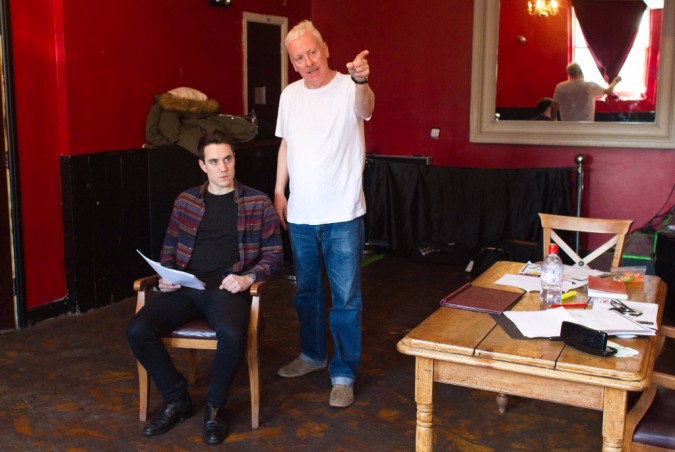
Heathcote Williams’ play about the dark side of fame and psychosis, The Local Stigmatic is about to return to the London stage for the first time since 1966 at the Old Red Lion Theatre.
We talked to director Michael Toumey about the challenges and complexity of his upcoming show.
.
What made you choose The Local Stigmatic? Do you have a personal attachment to the play?
My connection to the play goes back about 17 years. I was acting at the Union Theatre and a fellow actor mentioned it, then years later it came up again, as fellow actors and acting students kept on mentioning this play. On discovering that it was out of print in the UK, it then became a bit of a quest to track a copy down. Finally obtaining a secondhand edition in the USA, I realised that this was something I had to direct one day. It’s such an amazing, unique piece of writing.
What did you find especially challenging when directing this particular play, in comparison with others you’ve previously worked on?
I think the most challenging thing about directing this play is going to be getting really truthful performances from the actors using only the text. It’s going to be all about the acting and the text; everything is stripped back, and that is quite difficult. At times it’s very Beckett, sometimes very Pinter-esque, and they’re both difficult styles to direct in their own right. Extremely good actors could mess this up. This play could be awful in the wrong hands if you don’t respect it and it would be nothing to do with the play. It’s a very challenging piece.
Celebrating its 50th Anniversary, The Local Stigmatic has been through many productions. How did you give this one your personal touch?
I always think when directing something: “Is this something that I would like to see? Yes. Absolutely.” You have to almost direct it as a fan. It’s all about serving the work, the play, and if we can do that with integrity then we will succeed. That’s why I’m keeping it so minimal, because the work and the performances speak for themselves. Why try to do something fancy that you could do better in another medium? The writing and the acting are all that matters. This is pure theatre.
Do you have any favourite lines from the play?
My favourite line is when Graham says to the actor, David “Drink?” and David says “Campari”, and Graham replies, “That’s port and lemon in disguise, you’re all sewn up aren’t ya?”. It’s a real insult, making fun of his posh drink and threatening him through a simple observation. It says everything about Graham’s envy: “You’re all sewn up.” In other words, “You’ve got it all haven’t you? And you know I hate you for that.”
Would you want to meet any of the characters in real life? What would you say to them?
I wouldn’t mind meeting them in a crowded room where I knew I was safe, but I don’t think I’d like to meet them on my own. I would probably say “Hi guys, I’m not a celebrity, I’m a nobody, I’m no threat to you whatsoever!”.
Do you think parts of The Local Stigmatic still resonate with today’s society, even though it was written 50 years ago?
Absolutely. That play is more relevant today than it was 50 years ago. The typically English celebrities in 1966, like the Beatles, the Stones, Patrick Macnee, Tommy Steele, Diana Dors etc, they were revered and rare. If you saw a famous person it was a real treat. Fast forward 50 years and every second person you meet knows a celebrity. Now, where I live in Hampstead, you can spot a celebrity every five minutes. Not to mention the entire generation of YouTube. Andy Warhol’s 15 minutes of fame is everybody’s 30 seconds of fame today. So it doesn’t need to be updated at all, it’s actually way ahead of its time.
There are elements to it that are distinctly 60s: the celebrity column in the newspaper, which is the precursor to today’s OK! magazine; the dogs, which was a much bigger pastime back then, and the drink Campari, which would be Chablis today probably! But I don’t see any need to update those facts – the message is still the same and it gives it an interesting edge being in another era, but still so relevant today.
Ideas about celebrity and fame appear to be quite omnipresent in the production. Do you think society’s interest in celebrity is a blight or just a harmless guilty pleasure?
I think it’s a bit of both. At the end of the day, why you would be at all interested in what somebody has for their breakfast or where they’d like to go on holiday? I find that quite bizarre. Everybody likes a bit of gossip, but when it comes to shows like I’m a Celebrity Get Me out of Here, or TOWIE or Big Brother, they’re massive shows about nothing, except celebrity itself. So the obsession with real-life celebrities is almost like a disease. Graham and Ray wouldn’t have gone on Big Brother but you can imagine them being around on eviction night! I think Graham and Ray have a love hate relationship with celebrities. It’s a fine line. I remember when Heathcote Williams told us the story about the idea for the play. They were in a club in Soho somewhere, and he was with a friend who had an association with the Krays. They were drinking and having a good old time, then on the way out of the club they saw Patrick Macnee, the star of the Avengers TV show. His friend became almost psychotically violent about the fact that he was famous: “Who do you think you are?!”, threatening him and goading him. It’s almost like the natural conclusion of celebrity obsession. At what point does it turn from admiration to obsession? And how close is obsession to violence? It is a violating emotion, obsession.
What differentiates The Local Stigmatic from other plays with a similar theme?
To be honest I don’t know any other plays with a similar theme. I’m amazed that there isn’t a new play about the subject. I think there’s been stuff about cyber bullying, but not to do with fame and celebrity. I think once people see this play there’s definitely room for someone to write about celebrity today. It reminds me again of that old metaphor of the dog track: Graham and Ray are the dogs, and celebrity is the hare, it’s just out of reach. That’s in there for a reason. On top of that, you can never ultimately win at the dogs. There is a bitterness there. I come from a proper staunch working class background, I know there is an underlying resentment about people who are wealthy, and you can’t actually blame them for it, because they are born with nothing and they will die with nothing. Very rarely do you get out of that way of life. That’s the way Graham and Ray are heading.
In what way would you compare the Al Pacino film to the play? What are the differences between cinema and theatre?
I don’t think the film is subtle enough, it doesn’t investigate the complexities as the much as the play does. The play has enormous potential. Plus, the language in the play doesn’t come across in the same way on film as it does live, and with genuine London accents and having two young actors. Personally, I think those characters in the film are too old. The idea of them being young and capable of being physical but not entirely understanding what they’re doing or why they’re doing it.
What can you promise anyone who goes to see The Local Stigmatic at the Old Red Lion Theatre?
I can promise that they most definitely will be surprised. I think it will be an experience that will stay with them, that they will think about a lot, not just that night or the next day, but for quite a while. It’s going to be one of those plays that you walk out of and you’ll be going “Fucking hell! What was that?!”. It’s one of those pieces that will really challenge your morals. It will make you wonder where you are and where you stand on the whole of celebrity culture and, hopefully, think of it as having been a fantastic show!
Luisa Kapp
The Local Stigmatic is on at the Old Red Lion Theatre from 3rd until 28th May 2016, for further information or to book visit here.
http://www.theupcoming.co.uk/2016/04/26/the-local-stigmatic-a-chat-with-director-michael-tourney/




